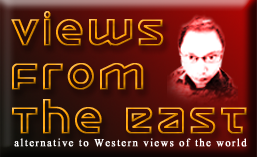 ‘Edgy and provocative’ – that is how most people interpret the cartoons which provoked the terrorist attack on the French weekly satirical newspaper Charlie Hebdo.
‘Edgy and provocative’ – that is how most people interpret the cartoons which provoked the terrorist attack on the French weekly satirical newspaper Charlie Hebdo.
Indeed, the terrorist attack is a lamentable act of defiance, especially in a world where the supposed champions of liberal democracy bombard the news with who is supposed to express and protect ‘freedom of speech’.
But in a world where the concept of the ‘clash of civilizations’ is screaming its urgency, the political right to one’s opinion is sadly becoming a tool to circumvent what would otherwise be a morally questionable act that is not acceptable in a different culture.
For his part, and despite being absent in the Paris Unity march where some 50 world leaders rallied to defy violence, Obama expressed his “deepest sympathy and solidarity to the people of France following the terrible terrorist attack in Paris”. Earlier, the US president said that “the fact that this was an attack on journalists, attack on our free press, also underscores the degree to which these terrorists fear freedom of speech and freedom of the press…a universal belief in the freedom of expression, is something that can’t be silenced because of the senseless violence of the few.”
Thus to sum what he stands for, Obama, and the West made us believe that they are the standard bearer of what a free society should be – a society where the freedom of speech (and criticism) can be in any form, no matter how offensive.
When others are not entitled to defy satirical narrative
Just back in December, a cyber-attack was launched against Sony Pictures when a preview of their satirical movie “The Interview” was leaked and the Western mainstream media quickly branded the attacks as ‘state sponsored terrorism’, which was blamed on North Korea.
In the movie, North Korean leader Kim Jong Un is shown to be the target of an assassination. Following the news of the attacks, the US president was quick to blame the cyber-attack to have originated from North Korea.
From a moral standpoint, a society that reacts emotionally to a depiction of their leader as having been a target of harm should be understandable. Simply put, such depiction of harm, even in a satirical manner, is not a laughing matter. How would Americans react if Obama was put in the same satirical narrative?
Freedom of expression should have limitations
For all its complexities, the least that a government should guarantee is to confine, if not limit, the concept of political expression. There is no denying that freedom of speech is one of the qualities of a democratic society. Conversely, to avoid clashing with other cultures, it is best for governments to confine freedom of expression to their own borders – that is to encourage freedom of speech on domestic matters while limiting speech that might provoke other societies. Thus, the recent Charlie Hebdo terrorist attacks have shown that out-of-control freedom of speech should have its own limits. In this case, it is clear that Muslims did not ‘buy’ what is supposed to be a ‘joke’.
As opposed to the West’s call for the ‘protection of freedom of expression’, it might be that the opposite should be what their society must pursue: to shut up, mind their own business, and avoid offending others. Indeed, moral relativism has its own perils: the West should start realizing this if they are to avoid harm, in a satirical manner or otherwise.

